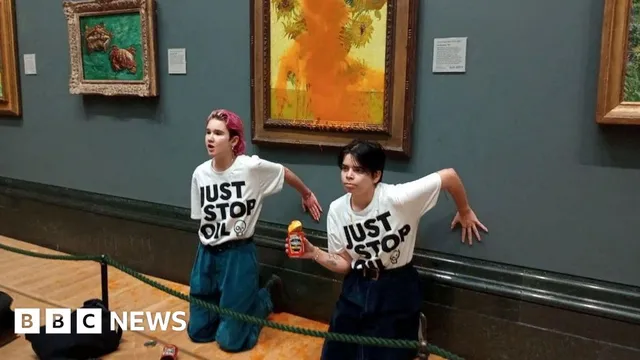
Just Stop Oil activists jailed for soup protest on Van Gogh
2024-09-28 16:59- Three Just Stop Oil activists threw soup on two Van Gogh paintings at the National Gallery, resulting in their arrest for criminal damage.
- This protest occurred shortly after two activists were sentenced for a similar act involving the same painting, raising concerns about the safety of cultural treasures.
- The ongoing protests reflect a growing trend of using art to draw attention to climate change issues, prompting discussions about the ethics of such actions.
Express your sentiment!
Insights
In recent protests, Just Stop Oil activists targeted Vincent van Gogh's Sunflowers paintings at the National Gallery in London. Three individuals threw an orange soup-like substance over the artworks, leading to their arrest on suspicion of criminal damage. This incident occurred shortly after two activists, Phoebe Plummer and Anna Holland, received jail sentences for a similar act involving the same painting in October 2022. The court expressed concern that the soup could have damaged the artwork despite it being protected by glass. The two jailed activists were sentenced to two years and 20 months, respectively, for their actions, which included gluing themselves to the wall beneath the painting. The judge emphasized the potential risk to the cultural treasure and criticized the activists for their disregard for the artwork's safety. Supporters of Just Stop Oil gathered outside the court, highlighting the ongoing tensions between environmental activism and the preservation of cultural heritage. This protest is part of a broader trend where activists have increasingly targeted famous artworks to draw attention to climate change and government policies regarding fossil fuels. The National Gallery has previously faced similar protests, including an incident where activists glued themselves to another famous painting, John Constable's The Hay Wain. The actions of these activists have sparked debates about the effectiveness and ethics of using art as a platform for protest, raising questions about the balance between activism and the protection of cultural assets.
Contexts
In a bold and controversial act, Just Stop Oil activists targeted the iconic Stonehenge, spraying orange powder paint on the ancient stones. This protest, which took place on June 19, aimed to draw attention to the urgent need for action on climate change, demanding an end to the extraction and burning of fossil fuels by 2030. The incident sparked outrage, with Prime Minister Rishi Sunak condemning it as a 'disgraceful act of vandalism' and Labour leader Sir Keir Starmer labeling the group as 'pathetic.' The protest was met with immediate public backlash, as witnesses attempted to intervene, expressing their dismay at the perceived desecration of a UNESCO World Heritage site. English Heritage, the organization responsible for the care of Stonehenge, reported that the orange powder posed a risk to the rare lichens growing on the stones. They acted swiftly to remove the paint, using blown air to preserve the delicate ecosystem, but acknowledged that the removal process itself could cause further harm. Just Stop Oil's actions are part of a broader strategy of civil disobedience aimed at breaking the media silence surrounding climate change. The group argues that their tactics, while controversial, are necessary to force the climate crisis into public discourse. They believe that the ongoing climate breakdown poses a significant threat to humanity, and their protests are a desperate call for collective action. As the dust settles on this latest incident, the future of climate activism remains uncertain. With a general election looming, Just Stop Oil hopes that a new Labour government will uphold its promise to halt new North Sea oil and gas projects, marking a potential victory for the movement. The question remains: will society heed their call, or will such protests continue to be viewed as mere vandalism?